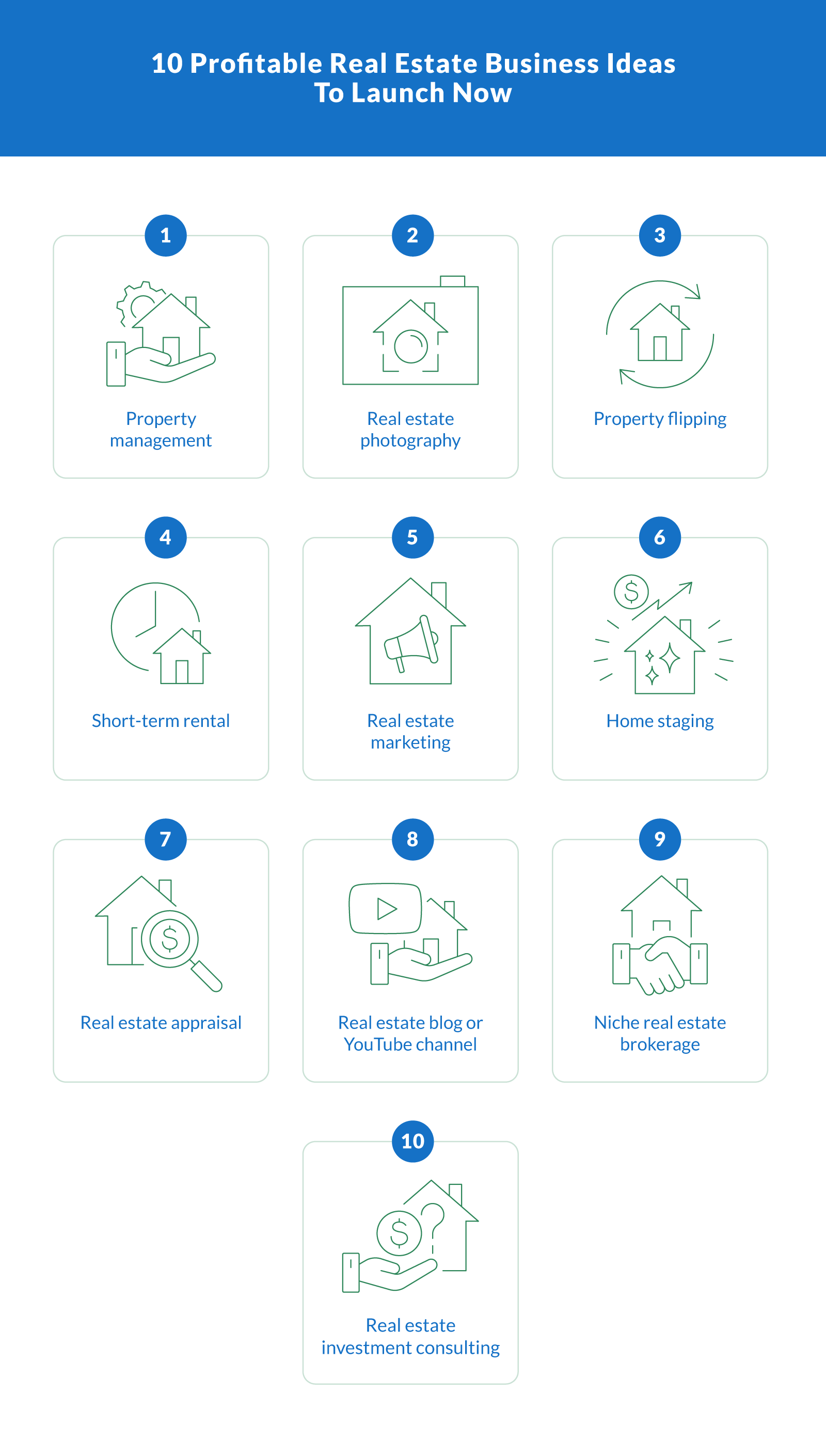Think you need a real estate license or deep pockets to break into the property world? Think again. From property management and short-term rentals to digital marketing and content creation, today's real estate business opportunities are more accessible than ever.
The real estate market offers high demand and diverse income streams, giving entrepreneurs the chance to build a business that fits their skills, schedule, and startup budget. Whether you're looking for hands-on property work or behind-the-scenes consulting, there's an option for you.
This article walks you through 10 real estate business ideas you can start today, along with startup steps, costs, and potential income streams. You'll also learn how to pick the right idea for your goals and how to grow your venture once it's off the ground. If you're ready to turn market trends into a profitable business, keep reading.
Why Real Estate Is a Smart Industry for Entrepreneurs
The real estate industry has long been one of the most attractive sectors for small business owners and startup founders. It's driven by high demand, steady population growth, and a constant need for housing, commercial space, and property services. That means plenty of opportunities for entrepreneurs who want to build a real estate business with long-term potential.
One of the biggest advantages is flexibility. You can run a solo venture, build a team, or scale your operations gradually. Many business models in the real estate market — like staging, marketing, or content creation — don't require a license or large upfront investment. And because real estate includes multiple income streams, from leasing and property management to consulting and digital content, it's easier to find a niche that fits your skill set.
As market trends continue to shift toward remote work and short-term rentals, new opportunities keep emerging for those willing to act. Whether you're launching a full-scale business or a side hustle, the real estate industry offers a path to becoming a profitable business owner.

10 Profitable Real Estate Ventures
You don't need to be a licensed agent to build a thriving real estate business. Many of the most profitable opportunities are service-based, require low startup costs, and can be scaled over time. Whether you're hands-on or tech-savvy, these real estate business ideas offer solid income streams, flexible models, and strong market demand.

1. Start a Property Management Company
Property management companies handle the day-to-day operations of rental properties for busy property owners. You can earn income through tenant placement, leasing services, and ongoing management.
Startup steps:
Register your business and choose a name.
Set up accounting and lease management systems.
Network with property owners and landlords.
Get bonded or insured if required in your state.
Legal considerations:
Local and state business licensing
Fair housing and landlord-tenant law compliance
Property management agreements
Startup costs typically cover business registration, liability insurance, software subscriptions, and basic marketing materials.
Estimated startup cost: $2,000 (lean) to $30,000+ (comprehensive)
2. Become a Real Estate Photographer
Real estate photographers help agents and homeowners sell faster by capturing high-quality images of real estate properties for listings.
Equipment you'll need:
DSLR or mirrorless camera
Tripod and wide-angle lens
Photo editing software (like Lightroom)
Marketing strategies to find clients:
Partner with real estate agents and brokerages.
List services on local business directories and social platforms.
Create a portfolio website with pricing and testimonials.
Startup costs go toward purchasing photography gear, editing software, a website, and initial marketing outreach.
Typical startup cost: $12,000 for competitive quality when starting from scratch
3. Flip Homes for Profit
Property flipping involves buying undervalued homes, making targeted renovations, and reselling them for a profit. It's a common real estate investment strategy that requires market insight and careful budgeting.
Key research tips before investing:
Analyze local property values and neighborhood trends.
Research renovation costs and timelines.
Monitor the real estate market for seasonal opportunities.
Flipping works best when you buy below market value and boost the property's appeal through smart upgrades. Startup costs include down payments, renovation expenses, holding costs, inspections, and resale marketing.
Typical startup cost: $40,000–$200,000+
4. Launch an Airbnb or Short-Term Rental Business
You can start a short-term rental business by listing your own property or managing rentals on behalf of others. It's a popular way to earn passive income from high-demand travel destinations.
Helpful property management tools:
Tips for high occupancy rates:
Hire a dependable cleaning service.
Use high-quality listing photos.
Keep response times fast and guest communication clear.
Startup costs cover furniture, cleaning supplies, listing fees, platform tools, and local business registration. You may also need to do some renovations to make the space more attractive to guests, improve functionality, or meet local short-term rental standards.
Typical startup cost: $4,000-$30,000, with $6,000 as the average for a single property
5. Start a Real Estate Marketing Agency
Real estate professionals and realtors rely on digital marketing to attract leads and sell homes faster. As an agency owner, you can help them grow through social media, SEO, email marketing, and content creation.
You'll build marketing strategies for real estate agents, brokerages, and property developers. Services like paid ads, website design, and lead nurturing can bring in steady monthly revenue while referrals roll in as you grow your client base. It's a great fit for marketers looking to serve a specific, high-value industry.
Startup costs generally include business setup, website development, branding, and paid ad testing to attract potential clients.
Typical startup cost:
$5,000–$10,000 (lean startup with remote tools and freelance professionals)
$25,000–$50,000 (mid-size launch with small in-house team and essential tech)
$100,000–$171,000 (full-fledged firm with advanced tools, branding, and office setup)
6. Offer Home Staging Services
Home staging helps listings stand out by showing potential buyers how a space could look fully furnished. Staged homes often sell faster and for higher prices, making this a valuable service for both real estate agents and homeowners.
This type of real estate photography business involves working directly with agents and sellers to furnish and decorate properties before showings or photo shoots. Your role includes selecting furniture, décor, and layout designs that highlight the home's best features.
Startup costs typically cover:
Basic inventory (sofas, rugs, décor)
Transportation and storage
Insurance and a business website
Typical startup cost:
$600 – $2,900 (lean model, using homeowner's furniture)
$5,000 – $10,000+ (with owned furniture, storage, and full-service setup)
7. Become a Real Estate Appraiser
Real estate appraisers estimate property values for lenders, buyers, and sellers. Their assessments are key in both residential and commercial property transactions.
Certification requirements typically include:
Pre-licensing education (varies by state)
State exam and licensing application
Supervised trainee hours (for higher-level credentials)
This role suits detail-oriented real estate professionals with strong analytical skills. While training takes time, earning potential grows with experience and specialization.
Startup costs usually include coursework, exam fees, MLS access, and basic tools.
Typical startup cost: $2,000–$6,000
8. Launch a Real Estate Blog or YouTube Channel
If you have industry knowledge and a knack for content creation, becoming a real estate blogger or YouTuber can be a scalable, low-cost business.
Monetization options include:
Ad revenue (Google AdSense or YouTube Partner Program)
Affiliate links to tools or products
Paid referrals for real estate investors or agents
Your content might cover local market trends, home buying tips, or real estate investing advice. The key is consistency and a strong social media presence to grow your audience.
Startup costs typically go toward a website domain, camera/mic setup, editing software, and branding.
Typical startup cost: $500–$2,500 for basic domain, hosting, camera/mic, and branding
9. Open a Niche Brokerage or Real Estate Team
Starting your own brokerage or real estate team gives you control over your business model, brand, and client base. Niches can help you stand out in a crowded market.
Popular niches include:
Luxury home sales
First-time homebuyers
You'll need to meet your state's broker licensing requirements and create a business plan to define your structure, services, and growth strategy. Some brokers operate solo, while others build out teams.
Startup costs include licensing, office space, marketing, and transaction management software.
Typical startup cost:
$10,000 (independent brokerage) to $200,000+ (franchise)
10. Become a Real Estate Investment Consultant
Experienced real estate investors can turn their knowledge into income by advising others on deals, cash flow strategies, and long-term property planning. This role is ideal for those with hands-on investing experience and a deep understanding of the market.
You can charge flat fees for one-time consultations or offer commission-based pricing on closed deals. Clients may include first-time investors or business owners expanding their portfolios.
Startup costs often include a business license, branding, legal setup, and marketing materials.
Typical startup cost:
$37,000–$75,000 (solo or lean real estate consultant using virtual tools and freelance support)
$75,000–$183,000 (full-service real estate consulting firm with office, staff, and full tech infrastructure)
Tips for Choosing the Right Real Estate Business Idea

Not sure which real estate business idea is right for you? Start by narrowing down options based on your experience, financial situation, and long-term goals. Here are a few practical ways to evaluate the best fit:
Do market research. Look at demand in your local area and see what real estate services or niches are underrepresented.
Outline a simple business plan. Focus on core services, pricing, target clients, and how you'll market your offering.
Know your budget. Factor in startup costs and the time it may take you to earn a steady income.
Play to your strengths. Choose an idea that aligns with your skills, whether in sales, marketing, design, or investing.
Talk to real estate professionals. Networking can give you insight into current trends and help you avoid common mistakes.
Consider risk tolerance. Start smaller if you're new or prefer low overhead, and scale up once you've built experience.
Taking the time to evaluate your options upfront will help you choose a business that fits your goals and positions you for success in the real estate industry.
Start Small, Grow Smart
You don't need a big budget or a real estate license to build a profitable business — just the right idea, a clear plan, and a willingness to take action. Many of the most successful entrepreneurs started with a small side hustle and scaled over time. Whether you're offering staging services or launching a short-term rental, the key is to get started and learn as you go.
Once your business has been operating for at least 6 months, you may qualify for funding to take it to the next level. Here are a few loan options from Clarify Capital and what they can help real estate business owners do:
Business line of credit. Access flexible working capital to cover staging inventory, marketing campaigns, or maintenance costs.
Term loan. Invest in larger needs like expanding your team, opening an office, or upgrading equipment.
Equipment financing. Spread out the cost of professional photography gear, computers, or furniture for staging.
Merchant cash advance. Use future sales to get fast funding when cash flow is tight during slow seasons.
No matter where you're starting, there's a way to grow — and we're here to help. Apply today to find the right financing option for your real estate business.

Michael Baynes
Co-founder, Clarify
Michael has over 15 years of experience in the business finance industry working directly with entrepreneurs. He co-founded Clarify Capital with the mission to cut through the noise in the finance industry by providing fast funding and clear answers. He holds dual degrees in Accounting and Finance from the Kelley School of Business at Indiana University. More about the Clarify team →
Related Posts





